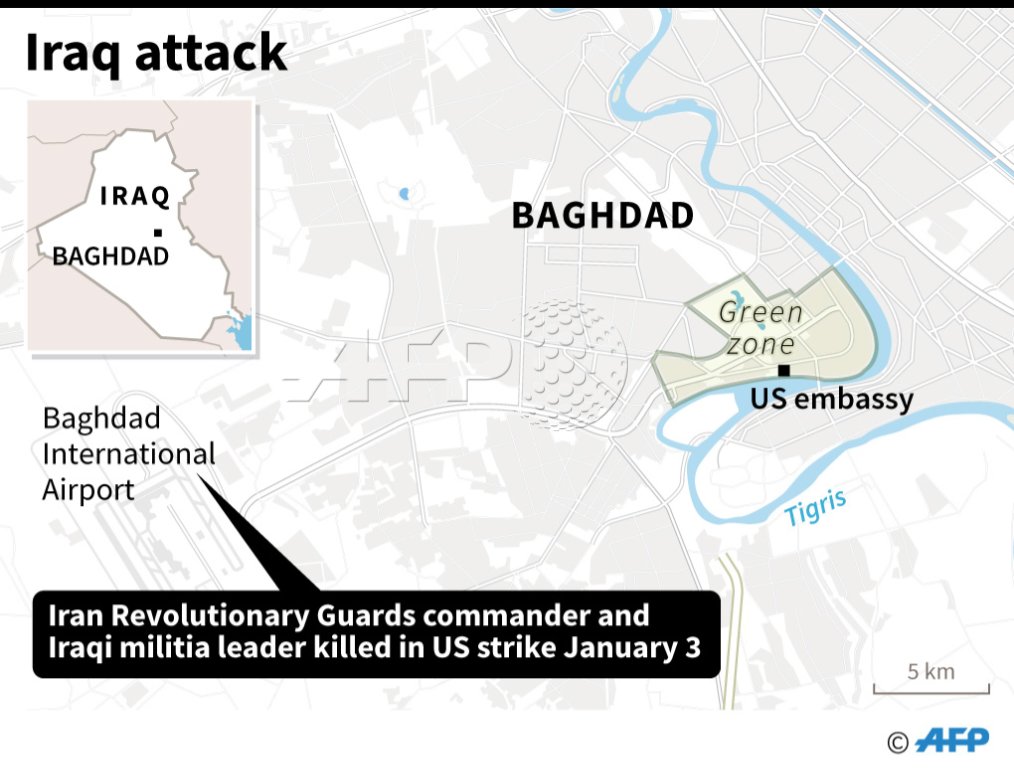Baghdad - Pentagon statement says strike was 'aimed at deterring future Iranian attack plans.'
Published: Fri 3 Jan 2020, 5:31 AM
Updated: Thu 23 Jan 2020, 12:09 PM
The United States killed Iranian Major-General Qassem Soleimani, head of the elite Quds Force and architect of Iran's spreading military influence in the Middle East, in an air strike on Friday at Baghdad airport, the Pentagon and Iran said.
Top Iraqi militia commander Abu Mahdi Al Muhandis, an adviser to Soleimani, was also killed in the attack, a militia spokesman said.
Related coverage:
Latest updates on US-Iran tensions
Soleimani killing: UAE calls for wisdom to avert confrontation
Iran names new Quds chief after Soleimani killing
US urges citizens to 'depart Iraq immediately' via airline
Iraqi PM condemns US killing of Iran's Soleimani
Trump reacts to Soleimani's killing in US airstrike in Iraq
Video: Iraq anti-govt protesters sing, dance after Soleimani death
Who is Soleimani: Fast facts you need to know
Soleimani was developing plans to attack Americans: Pentagon
Mike Pompeo responds to top Iranian commander's killing
Iran declares 3-day mourning following Soleimani's death
Iran supreme leader vows 'severe revenge' for Soleimani killing
Asian shares stumble, oil surges after US air strikes in Iraq
Soleimani's killing marks a dramatic escalation in the regional "shadow war" between Iran and the United States and its allies, which could quickly ratchet up tit-for-tat attacks.
Iran has been locked in a long conflict with the United States that escalated sharply last week with an attack on the US embassy in Iraq by pro-Iranian militiamen following a US air raid on the Kataeb Hezbollah militia, founded by Muhandis.
"At the direction of the President, the US military has taken decisive defensive action to protect US personnel abroad by killing Qassem Soleimani," the Pentagon said in a statement.
"This strike was aimed at deterring future Iranian attack plans," it added.
US officials, speaking on the condition of anonymity, said that Soleimani had been killed in a drone strike. Iran's Revolutionary Guards said he was killed in an attack by American helicopters.
Pictures showed burning debris on a road near the airport.
Khamenei said harsh revenge awaited the "criminals" who killed Soleimani and his death, though bitter, would double the motivation of the resistance against the United States and Israel.
"All enemies should know that the militant of resistance will continue with a doubled motivation, and a definite victory awaits the fighters in the holy war," Khamenei said in a statement carried by state television, in which he called for three days of national mourning.
Iran's Supreme Leader Ayatollah Ali Khamenei vowed harsh revenge.
State television presenters wore black and broadcast footage of Soleimani peering through binoculars across a desert and greeting a soldier, and of Muhandis speaking to followers.
Ahmed Al Assadi, a spokesman for Iraq's Popular Mobilisation Forces (PMF), the umbrella grouping of Iran-backed militias, blamed the United States and Israel for the killing of Soleimani and Muhandis.
Iraqi paramilitary groups said three rockets hit Baghdad International Airport, killing five members of Iraqi paramilitary groups and two "guests".
The rockets landed near the air cargo terminal, burning two vehicles, killing and injuring several people.
Local militia commander Abu Muntathar Al Hussaini told Reuters:
"Soleimani and Abu Mahdi Al Muhandis were riding in one vehicle when it was struck by two successive guided missiles launched from an American helicopter while they were on their way from the arrivals hall on the road that leads out of Baghdad Airport."
He said the second vehicle was carrying bodyguards from the PMF and was hit by one rocket.
"The American criminals had detailed information on the convoy's movements," Hussaini said.
Oil prices were up $3 on the news.
Forceful response likely
The slain commander's Quds Force, along with its stable of paramilitary proxies from Lebanon's Hezbollah to the PMF in Iraq - battle-hardened militias armed with missiles - has ample means to launch a multi-barrelled response against its enemies.
In September, US officials blamed Iran for a devastating missiles and drones attack on oil installations of Saudi Aramco, the Saudi state energy giant and world's largest oil exporter. The Trump administration did not respond, beyond heated rhetoric and threats.

Iran, for its part, has absorbed scores of air strikes and missile attacks, mainly carried out by Israel against its fighters and proxies in Syria and Iraq.
But analysts say Iran is likely to respond forcefully to the targeting of Soleimani, who it has built into a legend as its influence has spread across the region in the wake of the US-led invasion of Iraq in 2003 and subsequent occupation.
Soleimani, who has led the foreign arm of the Revolutionary Guards and has had a key role in fighting in Syria and Iraq, acquired celebrity status at home and abroad.
Soleimani survived several assassination attempts against him by Western, Israeli and Arab agencies over the past two decades.
His Quds Force, tasked with carrying out operations beyond Iran's borders, shored up support for Syrian President Bashar Al Assad when he looked close to defeat in the civil war raging since 2011 and also helped militiamen defeat Daesh in Iraq.
He became head of the Quds Force in 1998, a position in which he kept a low profile for years while he strengthened Iran's ties with Hezbollah in Lebanon, Syria's government and militia groups in Iraq.
Muhandis, who was killed with Soleimani, oversaw Iraq's PMF, a grouping of paramilitary groups mostly consisting of Iran-backed militias that was formally integrated into Iraqi armed forces.
His Kataeb Hezbollah militia, which received battlefield training from Lebanon's Hezbollah, has long targeted US forces and was one of the earliest groups to dispatch fighters to Syria to support Assad.
In 2009, Washington declared Kataib Hezbollah a foreign terrorist organization, saying it threatened stability in Iraq and declared Muhandis a terrorist. In 2007, a Kuwaiti court sentenced him to death in absentia for his involvement in the 1983 US and French embassy bombings in Kuwait.

